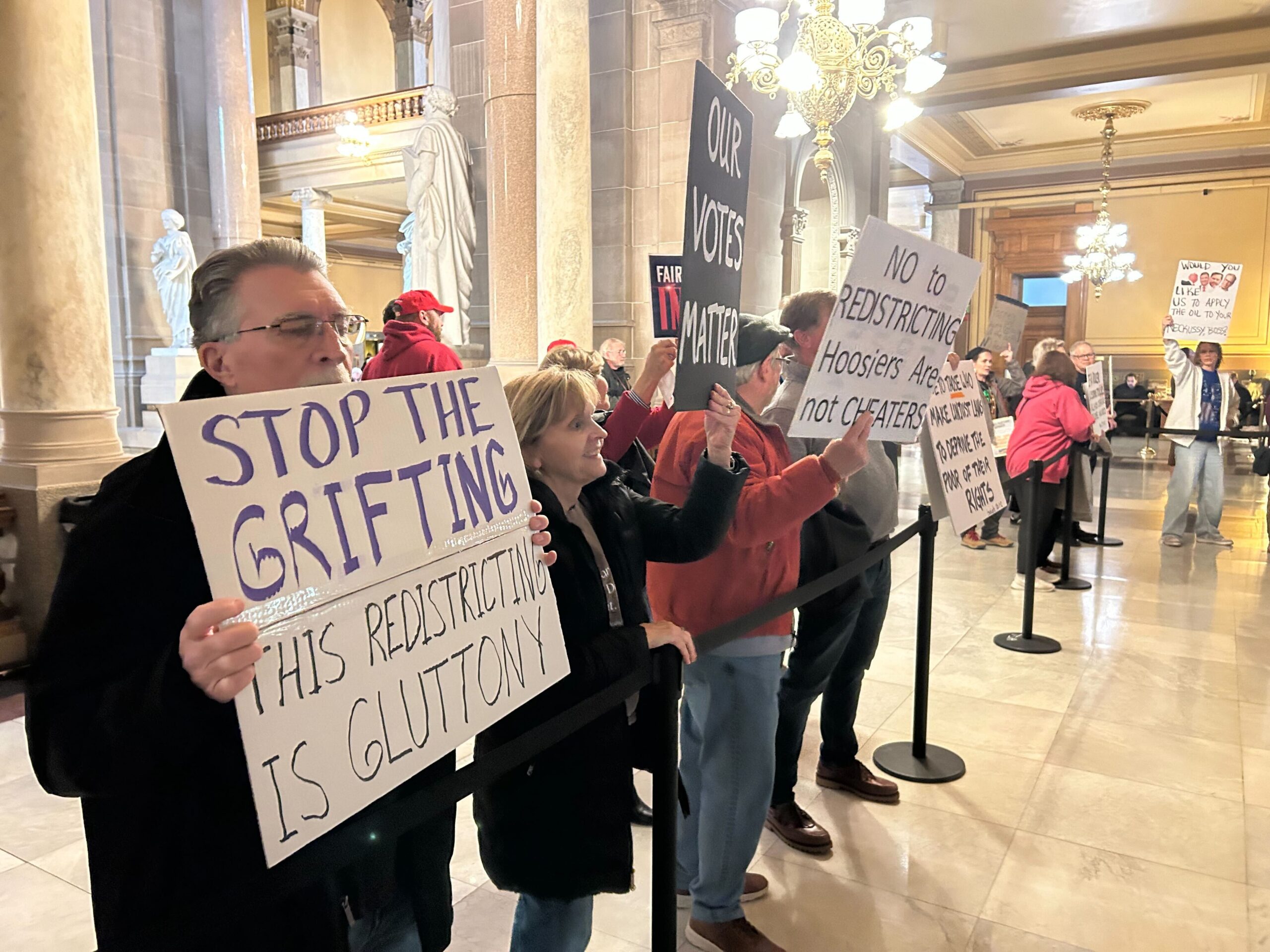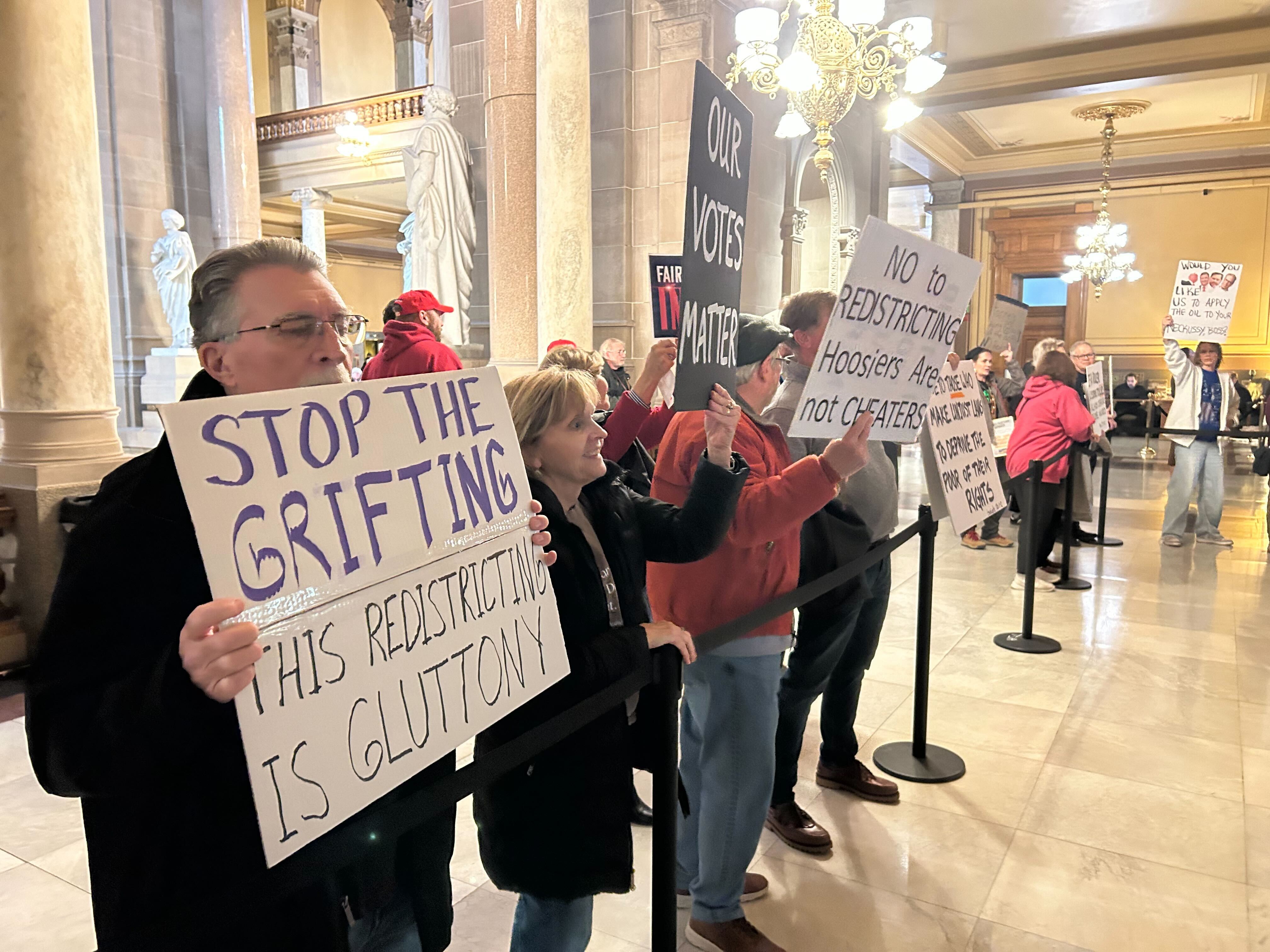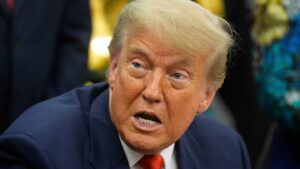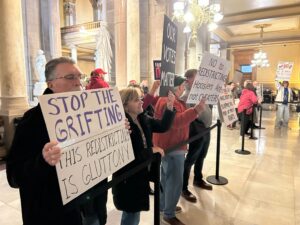Congress
Capitol agenda: A brutal blow for Johnson and Trump
Donald Trump and Mike Johnson failed to convince enough deficit hawks to back the latest budget plan for the president’s agenda — forcing the speaker to punt his planned Wednesday vote on the resolution and sending House leadership scrambling for a compromise that could satisfy hard-liners’ demands for more spending cuts.
Now, the speaker is staring down two potential options to get holdouts to come on board.
Plan A: Rules — GOP leaders “tentatively” plan to bring the budget blueprint back to the Rules Committee Thursday morning, Johnson said as he emerged from a meeting late Wednesday. They would tack on an amendment that would guarantee more spending cuts in the party-line package of tax cuts, border security investments, energy policies and more.
Rep. Lloyd Smucker has proposed tying the tax cuts to spending cuts — something he said would get him to “yes.” Another option is more straightforward: Language to the budget resolution that would require that a certain level of spending cuts be achieved in a final product that hard-liner holdouts want.
“There’s a mutual commitment that we’re going to find real savings in federal spending, because we have to do that,” Johnson said Wednesday night.
But that would kick the budget blueprint back to the Senate, which already tweaked this version of the budget once and has also held two all-night vote-a-ramas in less than six weeks. Senate Majority Leader John Thune was deeply unenthusiastic about holding a third: “I think everybody realizes that we’re at the time that we’ve got to move,” he said.
Plus, Thune would have to get key senators on board yet again. And many House moderates were privately counting on the Senate’s spending levels to avoid the steep $1.5 trillion to 2 trillion cuts proposed by the House.
Johnson is already trying to reassure them. He reiterated Wednesday night that House Republicans would not cut Medicare, Medicaid and Social Security benefits, even as their framework makes Medicaid cuts likely to meet their massive deficit reduction targets.
Plan B: Conference Committee — Heading straight to conference would be a rare and time-consuming process that would require House and Senate leaders and committee chairs to hash out the differences between their chambers’ plans. It’s a last resort, but one that some hard-liners have pushed in recent days to avoid a failed floor vote and force more concessions on spending cuts.
Meanwhile, the House also hasn’t played the full Trump card (even after the president Tuesday told House Republicans to “stop grandstanding”). Johnson said he stepped out of a meeting with holdouts Wednesday night to speak with Trump, who’s closely monitoring the situation.
“The president is very anxious, as I am, for us to get this done,” Johnson said after a late Wednesday meeting.
A note for your calendars: Johnson said it is not his “intention” to leave for the scheduled two-week Easter recess before adopting a budget resolution — though he noted that Passover starts this Saturday and he doesn’t want voting to stray into the holiday. The speaker said “the calendar is not our friend,” but “if we have to come back next week, then we’ll do that.”
What else we’re watching:
– GOP senators back Biden-era tax credit: Republican Sens. Lisa Murkowski and John Curtis are leading a letter to their leadership, alongside Sens. Thom Tillis and Jerry Moran, asking that clean-energy tax credits created by the Democrats’ 2022 climate law not be repealed as part of the GOP bill enacting Trump’s agenda. The senators say the credits are essential to the president’s goals of spurring American energy and manufacturing dominance.
– Michelle Bowman hearing: Trump’s pick to be the Federal Reserve’s top regulatory official faces Senate Banking this morning to pitch an overhaul of how the Fed supervises banks and argue for a “tailored approach” to regulation that makes it easier for financial institutions to innovate. Her industry-friendly approach broadly echoes the roadmap that Treasury Secretary Scott Bessent outlined this week for easing bank regulations.
Katherine Tully-McManus, Jennifer Scholtes and Meredith Lee Hill contributed to this report.
Congress
Pardoned Democrat Henry Cuellar wants GOP to probe his prosecutors
Just-pardoned Democratic Rep. Henry Cuellar is encouraging his Republican colleagues to investigate the prosecutors who charged him and his wife with bribery.
“I really think what they did was wrong,” Cuellar said in an interview Friday, adding that he has spoken to people in the House who are investigating prosecutors under former President Joe Biden. He said he plans to share information with them about his case.
Any such probe would represent a remarkable scrambling of partisan battle lines over the Justice Department. But it would be just the latest such jumble involving Cuellar, a self-proclaimed conservative Democrat who was an outlier in his party even before he faced corruption charges — and was suddenly pardoned Wednesday by President Donald Trump.
The investigation Cuellar referred to appears to be an ongoing probe of DOJ “weaponization” led by House Judiciary Chair Jim Jordan (R-Ohio).
Cuellar ran into Jordan shortly after Trump announced the pardon of Cuellar and his wife Wednesday, according to a person granted anonymity to describe the private conversation. Cuellar encouraged Jordan to request records from the Justice Department on his prosecution, and Jordan expressed openness to the idea, the person said.
“Based on what’s there, I definitely feel that there was misconduct by the prosecutors,” Cuellar said Friday. “So we’ll get more in details later on, but I certainly am convinced that this was weaponization.”
Jordan spokesperson Russell Dye declined to comment.
Cuellar and his wife were charged in 2024 with accepting $600,000 in bribes from foreign entities, including an oil and gas company owned by the government of Azerbaijan. Cuellar has said he and his wife were innocent of the charges.
In the Truth Social post announcing the pardon Wednesday, Trump blamed Biden for using “the FBI and DOJ to ‘take out’ a member of his own party” after Cuellar criticized Biden’s immigration policies.
Jordan has spearheaded investigations of Biden-era probes of Trump, leading a select subcommittee on the “Weaponization of the Federal Government.” He has recently ramped up the efforts, most recently subpoenaing former special counsel Jack Smith and accusing Smith’s team of “prosecutorial misconduct and constitutional abuses” in their investigations of Trump.
Cuellar reiterated in the interview that despite his criticism for his own party and his willingness to cooperate with a polarizing GOP probe, he has no plans to switch parties. He filed for reelection as a Democrat soon after he was pardoned Wednesday.
“I was a Democrat, and I’m still a Democrat,” he said.
Cuellar also said in the interview that neither he nor his family members had hired representatives to speak to the White House on his behalf — even as former lawyers and advisers to Trump have reported receiving significant sums to seek pardons on behalf of accused and convicted criminals.
Trump in Wednesday’s Truth Social post included a letter Cuellar’s daughters wrote to the president criticizing the prosecution as politically motivated and pleading for clemency.
Cuellar said he found out about the pardon Wednesday when asked by a reporter about Trump’s announcement.
“My daughters … saw their mom and dad go through a very difficult time and, on their own, they wrote a letter to the president,” he said. “Apparently the president read it and made a decision.”
Hailey Fuchs contributed to this report.
Congress
The national make-or-break issue of the year’: Redistricting fight gets reset after Trump’s Supreme Court win

INDIANAPOLIS — Republicans scored a major win in the redistricting fight when the Supreme Court reinstated Texas’ newly drawn congressional map on Thursday. But President Donald Trump and his allies are staring down a brewing rebellion in the Indiana Statehouse that could derail their momentum.
The high court decided in an apparent 6-3 vote to block a lower court ruling that deemed the Texas map a likely illegal race-based gerrymander. In doing so, the court’s conservative majority helped Republicans avert a nightmare scenario in which Trump’s redistricting push ultimately cost the party seats leading into the 2026 midterms.
The focus now shifts to Indianapolis, where the president’s allies are heaping pressure on GOP holdouts in the state Senate who are resisting Trump’s demands to draw new lines there that could net Republicans additional congressional seats.
In the state Capitol, as members of the state House debated final passage of a map supporters argue would all but guarantee an entirely Republican congressional delegation — from the current 7-2 split favoring the GOP — Turning Point USA held a sparsely attended rally to pressure Indiana Senate Republicans to do the same, over chants of “9-0.”
“This is now the national make-or-break issue of the year,” said Brett Galaszewski of Turning Point Action, adding that Indiana “is the center of the political universe.” Gov. Mike Braun and Lt. Gov. Micah Beckwith both addressed the crowd as they faced cheers, boos and shouts of “cheaters” from counterprotesters.
Earlier Friday, Turning Point Action announced that it, along with Trump-aligned super PACs, would spend in excess of eight figures to primary Indiana Republicans through 2028 if they opposed the new map. And Club for Growth President David McIntosh issued a “FINAL WARNING” to Indiana Senate President Pro Tem Rodric Bray, writing, “failure to get this done means you and any other opposition will be defeated and removed from office in your next election.”
All of it was designed to amp up pressure on reluctant Indiana Senate Republicans, who are expected to convene Monday to consider the new map. It’s unclear whether pro-redistricting allies have flipped any senators since they stalemated 19-19last month on a vote that was a close proxy for gerrymandering. The map passed the state House easily on Friday.

For now, Republicans have an edge across the six states that have seen a redraw. The GOP has nine more favorable seats across four states — Texas, Ohio, Missouri and North Carolina — while Democrats have five more blue-leaning seats in California, and an additional court-ordered likely pickup in Utah.
The fight over the new lines across the country is expected to carry into the new year. Privately, Democrats were not shocked by the Texas ruling, long assuming the conservative Supreme Court was going to allow the Texas map to stand. With the Texas maps in place, Democrats involved in the nationwide battle anticipate they’ll ultimately start the midterm cycle down a handful of seats, but the exact number isn’t clear.
Republicans see another key pickup opportunity in Florida, where party redistricting proponents think they could extract another three to five seats ahead of the midterm elections.
But while the state Legislature officially kicked off the mid-decade battle in the state on Thursday, Gov. Ron DeSantis and the Florida House lawmaker in charge of redistricting are at odds over how quickly to do it. And the state’s prospective redraw faces another roadblock: Florida’s anti-gerrymandering standards, which hold that a new district cannot be drawn for partisan gain.
Democrats, meanwhile, are homing in on Virginia. Five of the state’s 11 House seats are held by Republicans, who were trounced in a November election that bestowed on Virginia a Democratic governor, attorney general and a big Statehouse majority. Democrats there already kicked off a surprise redraw process right before the election. Now, Virginia House of Delegates Speaker Don Scott is teasing a major redraw early next year.
“10-1 is not out of the realm to be able to draw the maps in a succinct and community-based way,” he said this week. “We’re gonna take a look at it. We have to.”
In Missouri, Democrats are looking to challenge a map the GOP-controlled Legislature passed in September, leaving the state with just one blue district. They face a Thursday deadline to submit over 100,000 signatures that could trigger a referendum and temporarily block the new lines from being implemented, along with a complicated web of legal battles around the referendum process.
The Department of Justice, meanwhile, is going ahead with its lawsuit to challenge California’s new congressional map, even after Attorney General Pam Bondi celebrated the Supreme Court’s decision to greenlight Texas’ newly gerrymandered House map.
But the high court’s blessing of Texas’ Republican-friendly redrawn map came with a few Easter eggs that suggested how some of the other percolating redistricting battles are likely to play out. Most notably, three of the court’s conservative justices — Samuel Alito, Clarence Thomas and Neil Gorsuch — concluded that California’s redrawn districts were “indisputably” crafted for partisan advantage.
It’s unclear precisely how the justices’ decision will influence the broader national clash over mid-decade redistricting for 2026. Had the justices struck down Texas’ map, it may have increased pressure on other GOP-led states like Indiana and Florida to redraw their own boundaries to help give the party a better chance at retaining the House. On the other hand, the ruling’s clear blessing of mid-decade redistricting for partisan gain could ensure that it becomes a routine weapon in the arsenal of political warfare.
But conservative justices’ signaling on California’s map bodes poorly for the Trump administration, with the DOJ and California Gov. Gavin Newsom trading barbs following the decision.
“So you gonna drop your lawsuit against us right, Pam?” Newsom’s office asked on X Thursday night.
“Not a chance, Gavin — we will stop your DEI districts for 2026,” the Justice Department wrote back.
Adam Wren reported from Indianapolis, and Gregory Svirnovskiy and Kyle Cheney reported from Washington. Andrew Howard contributed to this report.
Congress
Mike Johnson scrambles to pass Pentagon bill as GOP ranks seethe
House Republicans spent this week venting about Mike Johnson, questioning the speaker’s hold on his tenuous House majority. Next week, he has to prove he’s capable of governing.
The annual Pentagon policy bill is due on the floor just in time to test Johnson’s ability to command and cajole his conference with must-pass legislation at stake. Already GOP leaders have had to delay release of bill text as they deal with a host of 11th-hour intraparty flare-ups that show just how hard it will be for the speaker to lead ahead of next year’s midterm elections.
Johnson is already bruised from a high-profile fight with Rep. Elise Stefanik (R-N.Y.), a member of the GOP leadership team, over a surveillance provision she wanted attached to the sprawling defense package. She got her way after publicly accusing the speaker of lying and sandbagging conservatives.
Other deeply divisive issues remain, ranging from cryptocurrency policy to in vitro fertilization, that could threaten to further splinter the House GOP and imperil the typically bipartisan Pentagon bill. The brouhaha threatens to complicate Johnson’s effort to hammer out a still-brewing Republican health care plan he’s promised to unveil by early next week.
“I think there’s a lot of members that are frustrated that we’re not doing the things that we said that we were going to do,” said Rep. Greg Steube (R-Fla.) when asked about Johnson’s leadership. “His response to that would be, we only have a [three] vote majority, but I think if you govern conservatively, Republicans will show up and vote for it.”
Steube, a member of the House Intelligence Committee, said he was “not happy” that Johnson initially excluded Stefanik’s legislation allowing for congressional notification of counterintelligence probes concerning candidates for federal office — part of an annual intelligence authorization legislation that, he said, included “a lot of conservative reforms.” The speaker argued he didn’t know about the measure and that Stefanik’s accusations were “false.”
Top GOP leaders are scrambling to douse the remaining fires and release text of the massive bill as early as Saturday, but it could slip into Sunday, according to four people granted anonymity to comment on internal planning. The negotiations are complicated, they say, because the final product must not only pass the GOP-controlled House but also withstand a possible Senate filibuster — meaning it needs to have Democratic buy-in.
“Getting an agreement right now between Republicans and Democrats in the House and Senate’s not easy,” Majority Leader Steve Scalise said. “But we’re getting close, and we want to get it done.”
Johnson played down the internal turmoil Thursday, saying Republicans “are exactly on the trajectory of where we’ve always planned to be.”
“Steady at the wheel, everybody,” he said. “It’s going to be fine.”
But the pending fights over the Pentagon bill — or the National Defense Authorization Act, as it is formally known — serve as a mini-preview for the turmoil Johnson is likely to face for the remainder of the 119th Congress as he tries to tackle health care, government funding and other flashpoints.
For instance, he is risking a showdown with conservative hard-liners if the final package doesn’t include a provision they favor that would ban the Federal Reserve from issuing a digital currency. Johnson promised House Freedom Caucus members he would include the provision in the defense bill amid a toxic intra-GOP row during the House’s shambolic “crypto week” this summer.
If the so-called central bank digital currency ban is missing, “it is a big deal,” said one House conservative who, like others quoted for this story, was granted anonymity to speak frankly about conference dynamics.
The fate of that provision is currently tied up in talks over another matter — one that highlights how Johnson is facing pressure from another influential corner of the House GOP: his committee chairs.
GOP leaders are taking steps to add a scaled-down version of a Senate housing proposal to the package. But Financial Services Chair French Hill (R-Ark.) opposes the move and wants to advance a slate of House housing bills through his committee later this month.
Johnson and Hill, normally low-key operators, had an intense conversation on the House floor Wednesday night as House and Senate GOP leaders went back-and-forth, including at the White House’s behest, over how to add some housing affordability measures to the defense bill.
“French is very logical and measured, but he’s very stern in what he believes and what he wants,” said a senior House Republican.
Johnson, a staunch social conservative, is also facing pressure from women and others in the House to add a measure expanding coverage for in vitro fertilization and other fertility services for military families under DOD’s Tricare health system. He’s also caught between big business and China hawks — two major GOP blocs — on whether to add in new restrictions on U.S. investments in China. Rep. John Moolenaar (R-Mich.), who chairs a select committee on China, said he was hopeful the provision would make it in but pointed to opposition from the “financial community.”
The NDAA is “a train that comes around once a year,” he added. “We’re hoping to include it.”
-
Uncategorized1 year ago
Bob Good to step down as Freedom Caucus chair this week
-

 Politics10 months ago
Politics10 months agoFormer ‘Squad’ members launching ‘Bowman and Bush’ YouTube show
-

 The Dictatorship10 months ago
The Dictatorship10 months agoPete Hegseth’s tenure at the Pentagon goes from bad to worse
-

 Politics10 months ago
Politics10 months agoBlue Light News’s Editorial Director Ryan Hutchins speaks at Blue Light News’s 2025 Governors Summit
-

 The Dictatorship10 months ago
The Dictatorship10 months agoLuigi Mangione acknowledges public support in first official statement since arrest
-

 The Josh Fourrier Show1 year ago
The Josh Fourrier Show1 year agoDOOMSDAY: Trump won, now what?
-

 Politics8 months ago
Politics8 months agoDemocrat challenging Joni Ernst: I want to ‘tear down’ party, ‘build it back up’
-

 Politics10 months ago
Politics10 months agoFormer Kentucky AG Daniel Cameron launches Senate bid





